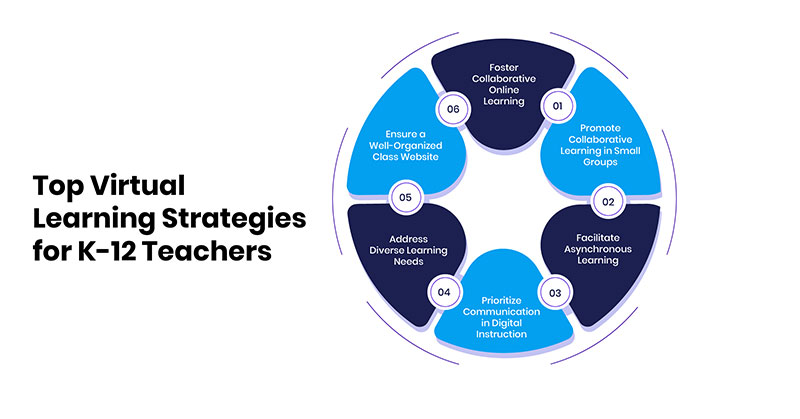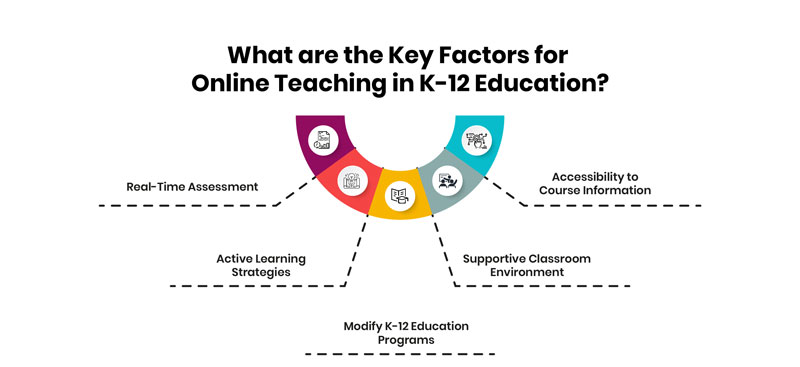Strategies for Enhancing Virtual K-12 Education Programs
February 02, 2024The K–12 schools have faced numerous challenges in recent years, particularly with the pandemic amplifying existing issues.
For school leaders and educators, the goal of establishing an online learning program is to deliver educational content in a flexible and tailored manner to individual learning styles. The landscape of K-12 education has undergone a transformative shift with the integration of virtual learning. Therefore, the key to ensuring that K-12 learners can effectively learn is by facilitating the creation of learning experiences that cater to each student's pace, fostering a personalized approach to education.
In this blog, we will walk you through the essential strategies for K-12 teachers and leaders, exploring how they can collaboratively enhance the K-12 education program in the virtual realm.
Top Strategies for K-12 Teachers in Creating Effective Virtual Learning Environments
The following set of strategies are modeled for K -12 teachers and leaders to enhance the accessibility of online instruction for their students.

-
Foster Collaborative Online Learning:
By promoting collaborative and cooperative learning strategies in digital classrooms, educators empower students to engage in interactive and shared learning experiences, cultivating advanced understanding, critical thinking, and social skills. Before implementing this strategy, ensure that consistent research, including exploration, underpins the effectiveness of group discussions, shared ideas, and collaborative activities. Leverage Learning Management Systems (LMS) features to assign group work, facilitate team competitions, and encourage class discussions. Engaging students in collaborative tasks alleviates isolation in online settings, augments overall engagement, and improves learning outcomes. -
Promote Collaborative Learning in Small Groups:
In many lesson plans, group work is pivotal for fostering teamwork and active learning. While translating this practice to the online environment may be challenging, platforms like Zoom, RingCentral, GoToMeeting, Microsoft Teams, and others offer breakout room options. These enable meeting organizers to establish smaller group discussions or collaborations within the main meeting, either in advance or during scheduled meetings. Additionally, students can collaborate through message boards, forums, and other features within your LMS. -
Facilitate Asynchronous Learning:
You can enhance online teaching strategies by incorporating asynchronous or self-guided learning. This approach complements live video conferencing sessions and office hours, granting students the flexibility to replay lessons and progress at their own pace. Record instructional sessions and ensure students are familiar with accessing these resources for a personalized learning experience. -
Prioritize Communication in Digital Instruction:
Effective communication is crucial for student engagement and success in online courses. Given the spatial nature of digital instruction, emphasize frequent, consistent, and individualized communication between teachers and students. Respond promptly to student emails and messages, conduct regular progress checks, and hold one-on-one conferences. -
Address Diverse Learning Needs:
School leaders must enhance online learning by diversifying content delivery methods and incorporating text, video, audio, and presentations. Tailor resources to various needs, including those of students with autism, participants in speech therapy, and other diverse learners. By leveraging these resources, teachers can effectively cater to the unique requirements of their students during the transition to online instruction. Regularly seek student feedback through surveys to make continuous adjustments to course content, ensuring a dynamic and engaging learning environment. -
Ensure a Well-Organized Class Website:
Teachers and education leaders must optimize the class website as an efficient hub for accessing content, posting assignments, and interacting with peers. Maintain an organized, up-to-date website with clear navigation paths, functional features, and a visually consistent layout to enhance students' online learning experience.
What are the Key Factors for Online Teaching in K-12 Education?
In examining the transition to online learning in K-12 education, several crucial factors emerged as essential for successful teaching in a virtual environment. These factors provide insights for future improvements in online education.

- Accessibility to Course Information: Ensuring accessibility to course information for students of all abilities is paramount. Online teaching should be inclusive, accommodating diverse learning needs and fostering an environment where every student can easily access and navigate course materials.
- Supportive Classroom Environment: Creating a supportive online classroom environment is crucial for student success. School leaders need a sense of community to foster positive interactions and address the unique challenges of remote learning to contribute to a more conducive and effective virtual learning space.
- Modify K-12 Education Programs: Modifying educational programs and instructions to meet the specific needs of individual students or student groups enhances the effectiveness of online teaching. Personalizing learning experiences ensures that each of your students receives the support and guidance necessary for academic growth.
- Active Learning Strategies: Incorporating "active learning" strategies is vital to keep students interested and excited about the online learning experience. Engaging activities, interactive components, and dynamic teaching methods contribute to sustained student involvement and enthusiasm in the virtual classroom.
- Real-Time Assessment: Real-time assessment of student learning provides K-12 teachers and leaders with valuable insights into their progress. Monitoring and evaluating student performance during online sessions allows educators to adapt their teaching strategies, address challenges promptly, and ensure optimal learning outcomes.
Aiding the Evolution of K-12 Teachers and Leaders
It is noteworthy that the K-12 teaching within the broader field of education is experiencing rapid expansion. The transformative power lies in the establishment and efficient management of robust schools, colleges, and universities.
Academik America’s initiation— the Education Policy Institute (EPI), is focused on improving educational institution management and regulation through research and knowledge standards. The initiatives include enriching the competence of various stakeholders, modeling excellence in rating frameworks, and designing executive education programs to develop comprehensive skills in senior professionals. The EPI has developed two programs— Global Fellow of Higher Education Management and Global Fellow of School Leadership and Management— exclusively for K–12 leaders and teachers to empower them with the requisite skills to achieve excellence in Educational Management. This includes navigating dynamic and ever-changing markets and environments and focusing on outcome-driven strategies.




